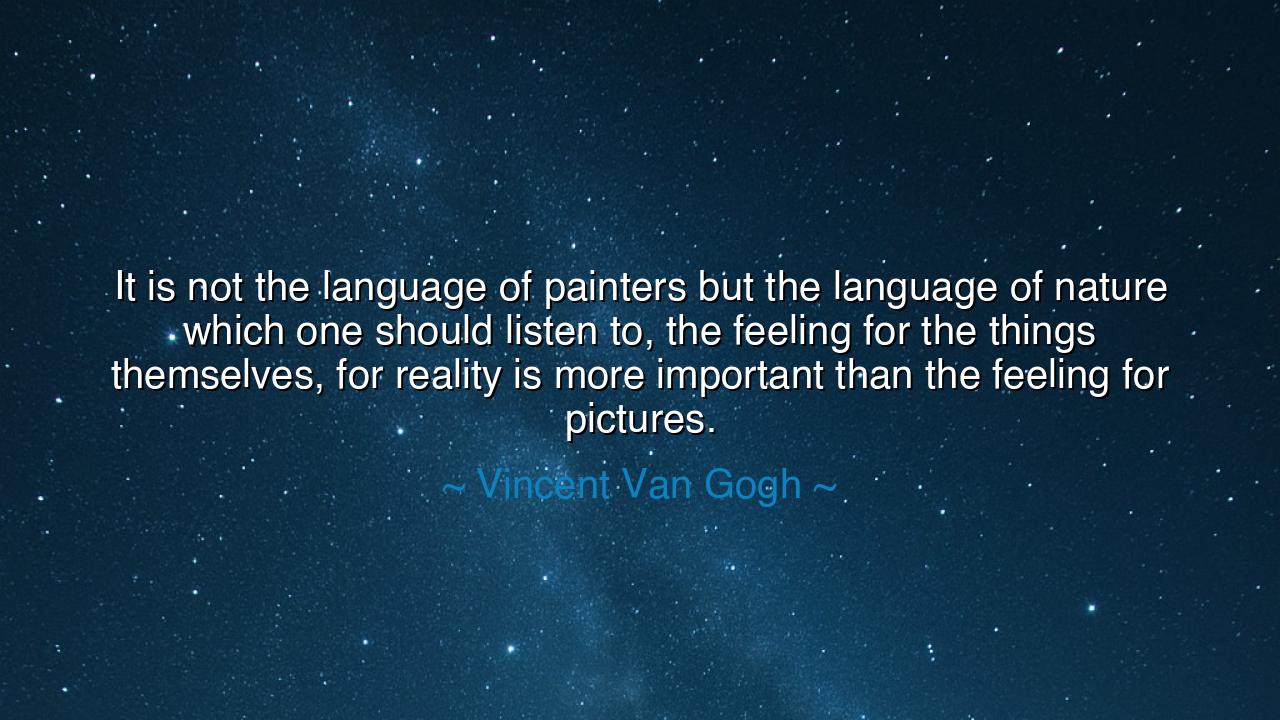
It is not the language of painters but the language of nature
It is not the language of painters but the language of nature which one should listen to, the feeling for the things themselves, for reality is more important than the feeling for pictures.






In these words of Vincent van Gogh, we hear the cry of an artist who sought truth beyond the surface of artifice: “It is not the language of painters but the language of nature which one should listen to, the feeling for the things themselves, for reality is more important than the feeling for pictures.” Here he reminds us that art is not a game of imitation nor the pursuit of fashion, but the act of listening to the eternal voice of nature. To feel deeply for the things themselves—the tree, the sky, the soil, the human face—is greater than to feel only for their painted likeness. For the picture is shadow, but nature is the light itself.
The origin of this truth is in van Gogh’s own struggle. He was not a painter for galleries alone but a pilgrim of the fields, walking among wheat stalks, gazing at the stars, kneeling before the humble flower. His brush was guided not by the academy’s rules but by the living pulse of reality, the heartbeat of creation itself. For him, reality was not cold fact, but the burning presence of life in its rawest form. The trembling of leaves in the wind, the sweat on a worker’s brow—these were the truths he longed to capture. He sought not the picture for its own sake, but the soul within the picture.
This is a wisdom known to the ancients as well. The Greek philosopher Aristotle spoke of art as mimesis, not mere copying, but revealing the essence of things. The Chinese sage Zhuangzi wrote that the painter must become the fish to paint the fish, must feel the spirit of water to capture its flow. Likewise, van Gogh urges us to see with more than eyes, to paint—or live—not from imitation of others, but from communion with reality itself.
Consider also the story of Michelangelo, who, when carving his sculptures, declared that the figures already lay within the stone, waiting to be released. He did not impose upon the marble, but listened to it, followed the veins, honored the block. So too van Gogh insists that one must listen to nature’s language, for it speaks truths deeper than technique. The master artist is not one who dazzles with skill, but one who listens humbly, who allows the world to reveal itself through his hands.
The emotional heart of this teaching is a warning: do not be seduced by the illusion of appearances. Pictures, like words, can become empty symbols if they are not tethered to the living essence they represent. A painting that copies a tree without capturing its vitality is a corpse on canvas. Likewise, a life lived chasing reflections—fashion, status, reputation—lacks the power of truth. It is better to be rooted in the real, even if simple, than to drown in the shallow waters of imitation.
The lesson for us, then, is clear: seek the reality beneath all things. Do not be content with appearances, whether in art, in people, or in life itself. When you speak, let it be from sincerity; when you create, let it flow from what you truly see and feel, not what others expect. Listen more often to the language of nature—the rustle of leaves, the silence of dawn, the rhythm of the sea—for in these sounds lies a wisdom no man-made system can replace.
Practically, this means to cultivate attention and authenticity. Walk outside without distraction, and notice the colors of the sky, the patterns of clouds, the texture of bark on a tree. When you work, ask not “what will others admire?” but “what truth am I revealing?” And when you encounter others, look beyond the mask they wear to the reality of their hearts. For in this discipline lies not only the power of true art, but the power of a true life.
Thus, van Gogh’s words are not for painters alone, but for all who wish to live deeply. To hear the language of nature is to hear the voice of God, the eternal rhythm of being. To prefer reality over illusion is to choose wisdom over vanity. Carry this teaching with you, O seeker, and may your life itself become a painting—not of hollow images, but of truths born from the heart of creation.






AAdministratorAdministrator
Welcome, honored guests. Please leave a comment, we will respond soon